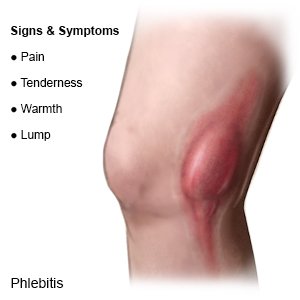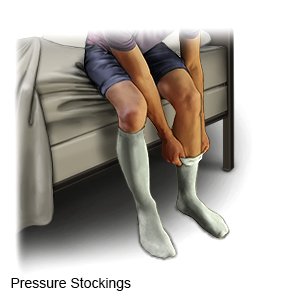Phlebitis
Medically reviewed by Drugs.com. Last updated on Aug 4, 2025.
Phlebitis is inflammation of the wall of your vein. Inflammation may be caused by damage to or infection of your vein. Phlebitis may occur in a vein in your arm or leg. Symptoms include pain, redness, and swelling near the vein. Symptoms may appear when you are receiving an IV medication, or 48 to 96 hours after you receive the medicine.
 |
DISCHARGE INSTRUCTIONS:
Return to the emergency department if:
- Your leg or arm turns pale or blue.
- Your leg or arm feels hot or cold.
- Your arm or leg feels warm, tender, and painful. It may look swollen and red.
Contact your healthcare provider if:
- You have a fever.
- You have more pain, swelling, or warmth near your vein.
- Your symptoms do not improve within 72 hours.
- You have questions or concerns about your condition or care.
Related medications
Medicines:
- NSAIDs , such as ibuprofen, help decrease swelling, pain, and fever. NSAIDs can cause stomach bleeding or kidney problems in certain people. If you take blood thinner medicine, always ask your healthcare provider if NSAIDs are safe for you. Always read the medicine label and follow directions.
- Take your medicine as directed. Contact your healthcare provider if you think your medicine is not helping or if you have side effects. Tell your provider if you are allergic to any medicine. Keep a list of the medicines, vitamins, and herbs you take. Include the amounts, and when and why you take them. Bring the list or the pill bottles to follow-up visits. Carry your medicine list with you in case of an emergency.
Follow up with your healthcare provider as directed:
Write down your questions so you remember to ask them during your visits.
Manage your symptoms:
- Apply a warm compress to your vein. This will help decrease swelling and pain. Wet a washcloth in warm water. Do not use hot water. Apply the warm compress for 10 minutes. Repeat this 4 times each day.
- Elevate your leg or arm above the level of your heart as often as you can. This will help decrease swelling and pain. Prop your leg or arm on pillows or blankets to keep it elevated comfortably.
- Wear pressure stockings if directed. Pressure stockings improve blood flow and help decrease pain and swelling. Pressure stockings can also help decrease your risk for blood clots in your legs. Wear the stockings during the day. Do not wear them overnight when you sleep.

- Do not inject illegal drugs. Talk to your healthcare provider if you use IV drugs and need help to quit.
© Copyright Merative 2025 Information is for End User's use only and may not be sold, redistributed or otherwise used for commercial purposes.
The above information is an educational aid only. It is not intended as medical advice for individual conditions or treatments. Talk to your doctor, nurse or pharmacist before following any medical regimen to see if it is safe and effective for you.
Further information
Always consult your healthcare provider to ensure the information displayed on this page applies to your personal circumstances.
